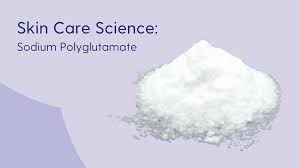Sodium Polyglutamate in Skin Care
Sodium Polyglutamate (PGA) is a potent humectant derived from fermented soybeans, known for its exceptional moisture-retention abilities. This naturally occurring biopolymer has garnered significant attention in the skincare industry due to its superior hydration capabilities, which some studies suggest surpass even hyaluronic acid (HA). PGA’s unique molecular structure allows it to hold up to 5000 times its weight in water, making it a crucial ingredient for maintaining skin moisture. Beyond its hydrating properties, research has also indicated that PGA may inhibit hyaluronidase, the enzyme responsible for breaking down HA in the skin, thereby prolonging the presence of HA and enhancing overall skin hydration.
In this blog, we discuss PGAs abilities and why it is found in some luxury skincare brands. To find out which ingredients and products are best for your skin, take our skin type quiz and you can shop using your skin type.
Intensely hydrating
Binds 5000x it’s weight in water
Blocks breakdown of hyaluronic acid
Found in humectant moisturizers
What is Sodium Polyglutamate in Skin Care?
Sodium Polyglutamate (PGA) is a powerful skincare ingredient composed of repeating units of the amino acid glutamic acid. This biopolymer is primarily derived from the fermentation of soybeans, where specific bacteria synthesize it as part of their metabolic processes.
How it Works
Sodium polyglutamate’s ability to form a protective film on the skin’s surface not only helps retain moisture but also enhances the skin’s elasticity and smoothness. Additionally, PGA has been shown to inhibit hyaluronidase (1), the enzyme that breaks down hyaluronic acid, thereby extending the hydration benefits of hyaluronic acid in the skin. These properties make Sodium Polyglutamate an exceptional ingredient for boosting skin hydration, improving skin texture, and offering long-lasting moisture retention, surpassing even hyaluronic acid in some aspects.
Blocks Hyaluronidase
Hyaluronidase is an enzyme that breaks down hyaluronic acid (HA), a key substance in the skin responsible for maintaining moisture, elasticity, and volume. HA is a glycosaminoglycan that can attract and retain water, keeping the skin hydrated and plump. When hyaluronidase degrades these HA molecules, the skin loses moisture and elasticity.
Maintaining high levels of HA is essential for keeping the skin hydrated, smooth, and youthful-looking. Sodium Polyglutamate (PGA) inhibits hyaluronidase, preserving HA levels in the skin. By blocking this enzyme, PGA helps the skin retain moisture, enhances the effectiveness of HA-based skincare products, and promotes longer-lasting hydration and a more youthful appearance.
Humectant
The unique structure of PGA allows it to hold an extraordinary amount of water—up to 5000 times its weight—making it a highly effective humectant.
Benefits
Sodium Polyglutamate offers a range of benefits that make it an ideal addition to skincare formulations. Below are some key benefits of using Sodium Polyglutamate:
Exceptional Moisture Retention: PGA’s ability to bind large amounts of water helps maintain optimal skin hydration, keeping the skin plump, soft, and smooth.
Hyaluronidase Inhibition: By potentially inhibiting the enzyme that breaks down HA, PGA helps sustain higher levels of hyaluronic acid in the skin, enhancing long-term hydration.
Improved Skin Elasticity: Regular use of PGA can lead to increased skin elasticity, reducing the appearance of fine lines and wrinkles.
Film-Forming Properties: PGA creates a protective barrier on the skin’s surface, preventing moisture loss and protecting the skin from environmental stressors.
Compatibility with Other Ingredients: PGA works well with a variety of other skincare ingredients, making it a versatile addition to different formulations.
Side Effects and Safety
While Sodium Polyglutamate is generally well-tolerated and safe for most skin types. The EWG gives it it’ safest rating of a 1.
There are a few considerations to keep in mind:
Potential Irritation for Sensitive Skin: In rare cases, particularly for those with highly sensitive skin, PGA may cause mild irritation.
Overhydration: Excessive use of humectants like PGA in environments with high humidity may lead to overhydration, where too much moisture is absorbed, potentially leading to puffiness under the eyes. This is very temporary and will only last a day.
Products Containing Sodium Polyglutamate
Several skincare products harness the hydrating power of Sodium Polyglutamate. Notably, Neocutis has incorporated this ingredient into one of it’s advanced hydrating HA serums. These are our favorite dermatologist- recommended products with PGA. This is a unique ingredient not found in many products yet.
Research
Recent research has highlighted the significant potential of Sodium Polyglutamate (PGA) as a versatile and potent ingredient in cosmetic formulations. Studies, such as those conducted by Serra et al. (2024), have underscored PGA’s remarkable moisture retention abilities, surpassing even hyaluronic acid, making it an exceptional candidate for skincare products aimed at improving hydration and skin texture. Additionally, PGA’s ability to inhibit hyaluronidase, the enzyme that breaks down hyaluronic acid, has been substantiated through various studies, including those documented by Liu et al. (2022), who demonstrated its effectiveness in preserving HA levels in the skin, thereby enhancing hydration and promoting a more youthful appearance.
Furthermore, PGA’s applications extend beyond just hydration. Its film-forming capabilities and biocompatibility make it an ideal ingredient for a wide range of cosmetic products, from moisturizers to sunscreens. This has been supported by extensive research showing that PGA not only improves skin elasticity but also acts as a barrier against environmental stressors, thus offering comprehensive skin protection. Moreover, the potential of PGA in anti-aging formulations is backed by studies highlighting its ability to stimulate collagen production and enhance skin firmness, further validating its role as a multifunctional skincare ingredient.
To find out if this intensely hydrating ingredient is right for your skin type, take our 16 skin types quiz.
DQH Knowledge drop: In your 20s, your skin cell turnover decreases. (Cell turnover is a key component in keeping your skin youthful.) You know what else slows down? Your collagen production. Starting in your 20s, collagen decreases by about 1 percent per year. Should you want to prevent fine lines and wrinkles, start by eliminating behaviors that contribute to premature aging. “If it’s bad for you, it’s bad for your skin,” says dermatologist Michel Somenek.
“Cigarette smoking reduces blood flow to the skin and causes premature wrinkling and a dull skin texture. Making the repeated pursed motion to inhale can also cause smoker’s lines. Alcohol and recreational drugs are toxins for the skin that damage its cellular structure and DNA,” Somenek tells us. “The faster you eliminate vices while you are young, the better chance your skin and body have to recuperate.” Also, adopting an anti-aging routine in your 20s is key. After all, the best offense is a good defense. We spoke to Somenek and experts Joshua Ross and Audrey Kunin to find out more.
Keep reading for the best anti-aging products for your 20s, according to skincare professionals.
Sunscreen
“We all know that the sun is the number one cause of skin aging and starting the prevention in your 20s is very important,” Ross says. “The majority of your sun damage won’t start to appear until you’re in your 30s, so don’t wait until you see it surface or you’ll be behind the curve. Stay ahead of it with a good-quality zinc-based sunscreen worn daily.”
Farmacy Green Defense Daily Mineral Sunscreen
An invisible sunscreen with SPF 30, plus botanical extracts meant to protect skin with tons of antioxidants. Bonus: It’s clean and fine to use under makeup.
Bareminerals Complexion Rescue™ Tinted Moisturizer Broad Spectrum SPF 30
Although we recommend you use your SPF and moisturizer separately, we also understand moments when you don’t have time or energy for that extra step. For those times, this bareMinerals moisturizer is a great thing to have on hand.
Vitamin C Serum
“A great introduction to anti-aging is to start with a vitamin C serum in your morning skincare routine,” Ross says. “It’s a powerful antioxidant that will neutralize free radicals and brighten the skin.” He adds that it’s a great way to counteract the effects of the sun’s harmful rays, which, as previously mentioned, are among the biggest causes of premature aging.
Drunk Elephant C-Firma™ Vitamin C Day Serum
The Drunk Elephant C-Firma is a lightweight serum that promises to give skin a glow by combining the brightening powers of vitamin C with ferulic acid, l-ascorbic acid, and vitamin E. The included sodium hyaluronate is meant to replace hydration loss, so you shouldn’t have to deal with any irritation.
Sunday Riley C.E.O. Rapid Flash Brightening Serum
This potent serum is jam-packed with vitamin C (15 percent, to be exact), which means it’s a potential superstar at both brightening skin and dousing it in antioxidants.
Peptides
Using peptides on your skin has many benefits, says Somenek. “The skin barrier is what defends the body against pollution, UV rays, bacteria, and toxins. It can be damaged by several everyday factors. Using topical peptides aids in building a stronger barrier,” he says. “Peptides comprise elastic fibers, which are a type of protein. These fibers help to make skin appear taut and firm. Peptides can also help repair damaged skin, relieve inflammation, and even out skin tone. Some peptides can kill acne-causing bacteria that is common in 20-somethings.”
Kunin agrees, saying, “Peptides are an excellent entry point for supporting collagen.” She recommends looking for face and eye treatments that contain these collagen-boosting powerhouses.
Charlotte Tilbury Magic Eye Rescue Cream
This Charlotte Tilbury super-emollient eye cream has a base of coconut oil and shea butter (read: it’s incredibly hydrating). Botanicals plus peptides are meant to help reduce dark circles and boost collagen, respectively.
This creamy moisturizer serves up potent collagen-boosting peptides and pycnogenol, and antioxidant-rich vitamin C. “Instead of sitting on top of the skin, peptides penetrate the outer layer so they go deep. The ‘signals’ they send tell the cells to produce elastin and collagen, which are needed for youthful-looking skin,” explains Somenek.
At-Home Peel Pads
Remember that skin cell turnover fiasco we talked about earlier? One way to help support it is by exfoliating. “Exfoliation is important to help keep skin fresh and luminous,” Kunin says. She recommends using at-home peel pads as an easy and effective way to exfoliate.
“The goal in your 20s is to fight the slowing pace of cell turnover. It is wise to use products that gently exfoliate, yet still remove oil and other impurities. Products that have Alpha Hydroxy Acids (AHA) or Beta Hydroxy Acids (BHA) are a good choice.”
According to Somenek, you should only exfoliate two to three times a week. “People of all ages are guilty of over-exfoliating and that can be too much of a good thing,” he says.
Dermadoctor Kakadu C Intensive Vitamin C Peel Pad
A few swipes of this Derma Doctor powerful peel pad promise to leave your skin glowing and smooth, thanks to the seven (yes, seven) types of chemical exfoliants, including AHA and BHA. It also contains vitamin C via Kakadu plum extract for added brightening and antioxidant protection.
KEY INGREDIENTS Kakadu plum extract is sourced from the Kakadu plum, a fruit grown in northern Australia. It contains vitamin C, which restores the skin’s natural barrier, increases collagen production, and soothes irritation.
Dr. Dennis Gross Skincare Alpha Beta® Universal Daily Peel Pads
These are the gold standard of peel pads, with a cult following and over 900 five-star reviews on Sephora. They’re easy to use and contain a blend of anti-aging exfoliating acids.
Emollient Night Cream
“In your 20s, you need to start upping the hydration in your skincare routine. You may have been cautious of over-moisturizing because of acne in your teens, but as you enter your 20s, your skin transitions and becomes drier,” Ross says. “I recommend an emollient night cream added into your evening skincare regimen.”
“Twenty-somethings need to make sure that they are not using creams that will clog their pores and cause excess oil production,” says Somenek. Opt for non-comedogenic products.
Cerave Skin Renewing Night Cream
One great choice is the CeraVe Skin Renewing Night Cream, which is a non-comedogenic night cream that leaves skin soft and glowy. It combines the moisturizing powers of ceramides and hyaluronic acid.
RoC Retinol Correxion Max Hydration Creme
“The best night cream ingredients contain retinol, benzoyl peroxide, and/or salicylic acid or hyaluronic acid. The goal is to moisturize, yet remove excess oil,” says Somenek. This Roc Retinol Correxion cream fits the bill as it contains both hyaluronic acid and retinol so it promises to moisturize while also being non-comedogenic.



